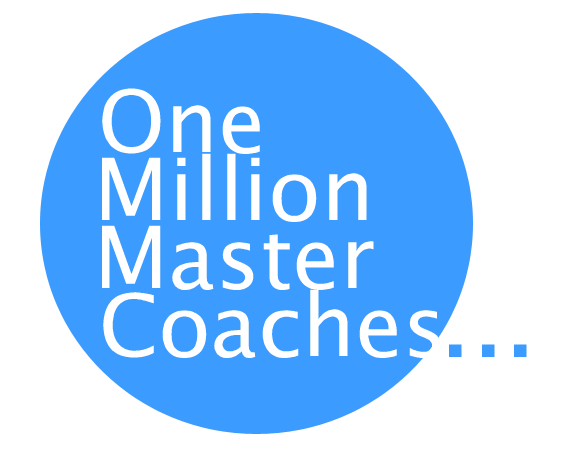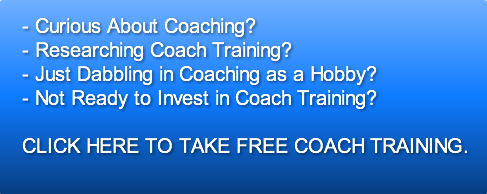 Yesterday, I received a letter in the mail congratulating me on my new BCC (Board Certified Coach) credential from CCE (Center for Credentialing and Education).
Yesterday, I received a letter in the mail congratulating me on my new BCC (Board Certified Coach) credential from CCE (Center for Credentialing and Education).
It was nice to get, but no surprise.
CCE, a non-profit which has been certifying a variety of counselors for years, recently stepped into the realm of business, executive and life coach certification, with this impressive-sounding new credential. But any executive, business or life coach who was previously certified by the ICF or IAC and who could demonstrate that they already have coach-specific training, got grandfathered into the BCC for $100. The only catch was that we had to take a norming exam to help CCE establish appropriate exam questions for future coaches who test for the BCC.
Even though I have reservations about the new BCC life coach certification, I decided to take the plunge and get it for the following reasons:
- Life coach certifications from independent certifiers are generally the most respected in coaching, because with no regulation, some coach training schools (at least the ones that are disreputable) sometimes have very low coach certification requirements (or no requirements other than a fee).
- I think competition between independent certifiers is good for coaches, their clients and the coaching industry, because it forces the certifiers to listen to us and upgrade their services in order to stay relevant. So a new independent coach certifier may be positive for the profession.
- At this stage of the game, no single life coach certification organization is the recognized leader, worldwide. The ICF claims this distinction, but most coaches do not agree, especially in fast-growth markets, like Asia. So it may be a good idea to be certified by more than one independent coach certification organization.
That said, I have plenty of reservations about the new Board Certified Coach credential and may not use 'BCC' after my name in most situations - at least not yet. Here's why:
- As one of my colleagues, who is certified by both the IAC and ICF, recently commented, a certification from an organization that mainly certifies counselors may further confuse the public about the difference between coaching, therapy and counseling. Appearances to the contrary, business and life coaching are completely different from either counseling or psychotherapy. Coaching is based on different paradigms and does not target clients who are mentally ill or in crisis. A decade or so ago, when I became a coach, the profession of coaching was under attack by psychology professionals, who claimed we were practicing therapy without a license. Then a landmark lawsuit in the state of Colorado established life coaching as a separate profession from psychotherapy. Furthermore, the reason coaching is still not legally regulated anywhere is because coaches don't work with vulnerable populations. Since that landmark case, therapists and counselors have jumped on the coaching bandwagon in large numbers, because they aren't hamstrung by regulations, they've seen how effective coaching can be and because they can charge more for it. As another coaching colleague commented: The confusion between coaching and therapy isn't because coaches are practicing bad therapy; it's because too many therapists are practicing bad coaching. One of the reasons I decided to get the BCC anyway, is so I can watch from the inside how CCE's influence plays out and can speak up as needed. If CCE does its job well, it could actually cut down on the confusion and erroneous assumptions that counselors and therapists sometimes make when they hang out their coaching shingles.
- CCE bases the BCC credential solely on college degrees, coach-specific training and passage of a multiple-choice test. Reputable life coach certifications always require demonstration of coaching skills. Why? Because unlike virtually any other profession, including counseling and psychotherapy, efficacy in business and life coaching is not based on expert knowledge, but on the skill of assisting coaching clients to leverage their own knowledge, thoughts, actions, gifts, etc. In other words, coaching is a skill set, not a knowledge base. A degree has little or nothing to do with competency in coaching. Coach training is a very good thing, but doesn't automatically ensure a skilled coach. And multiple-choice tests measure knowledge, not coaching skills. To get my stamp of approval, CCE needs to add an oral test to their certification requirements.
- CCE claims its multiple-choice test is the first scientifically-based measurement of coaching knowledge, but is it really? The 'science' is based on the answers to test questions that coaches who are certified by the 'less scientific' IAC and ICF gave on BCC norming tests. In other words, it's piggy-backing on knowledge collected by thousands of non-science-based coaches and calling that scientific. In any case, one of the reasons coaching has rocketed to the forefront of human development is because coaches have been free to mix findings from neuroscience and positive psychology with ancient wisdom traditions, plus their own insights and intuition, to create new approaches to human growth. Science is good, but results are what matter.
- CCE claims to be the first certifier of coaches that is itself 'accredited'. That's good, but it may not mean what you think. Usually, when we talk of accreditation in education, what we're referring to is the 'gold standard' in accreditation, which in the United States (which influences education around the world), means that your educational institution is accredited by a not-for-profit regional accrediting agency that is in turn, approved by the U.S. Department of Education. CCE is not accredited by such an agency. I tried to trace its accreditation back to the USDE, but only got as far back as an agency that accredits engineers (not exactly related to coaching). To my knowledge, no independent coach certifier, nor educator of coaches, possesses the gold standard in accreditation. That doesn't mean they aren't good, it just means they don't have the ultimate stamp of approval in education. (Beware though, of phony 'associations' that are invented by un-scrupulous 'coaching schools' or more-aptly, certification mills, just so they can claim to be 'accredited' by somebody.) CCE's accreditation doesn't make it a better source of life coach certification. In fact, they may not understand the profession of coaching as well as either the ICF or IAC.
- There has been some suggestion (unconfirmed) that the CCE may require its Board Certified Coaches to administer a psychological profile that measures the mental health of new coaching clients, in order to refer them out to psychotherapists. This would be no more appropriate than requiring Certified Financial Planners to test the mental health of their clients (after all, behavioral economics is the latest hot specialty for therapists), or requiring bartenders to test their customers for alcoholism (shouldn't some of those barflies be in rehab?). I know many psychologists believe 90 - 100% of all people are at least neurotic and could benefit from therapy, but coaches aren't in the mental health business, are untrained in the area of diagnosis and in many locations it would actually be illegal for an untrained professional to try to diagnose a mental illness. What coaches are responsible for is helping their clients reach the clients' desired results. If coaching isn't effective in reaching those results and the coach suspects psychotherapy could help, they can best serve their clients by sharing that observation and declining to waste the clients' money by continuing the coaching. But coaches testing for psychopathology? That won't serve coaching clients (but might serve counselors and therapists), because the real test of whether coaching will 'work' for a client is not the client's diagnosis, but whether the client is ready to take full responsibility for their own life. If it comes between keeping my BCC or succumbing to a requirement to administer psychological tests, I may give up the credential and I'm sure I'm not alone. But I am so far taking a 'wait and see' attitude towards this.
- CCE's ethical standards for BCCs are more appropriate for counselors and therapists than for life coaches. That's not automatically bad, but suggests that CCE itself, is confused about the differences between counseling and coaching. Here are SCM's ethical standards.
- The BCC hasn't yet stood the test of time. Thus far, the Board Certified Coach credential is not widely recognized, nor is it the the gold standard in coaching. For the time being, I would recommend the BCC only as a provisional certification, on the level of the ICF's ACC (Associate Credentialed Coach), that a new coach might want, while they work toward a more recognized coach certification.
What do you think? Share your comments and concerns about the new Board Certified Coach credential in the comments area below.





 Want to know
Want to know 
 Once upon a time, in a land far far away, where everything always looked as it should, if you hired a
Once upon a time, in a land far far away, where everything always looked as it should, if you hired a 
 I finally have an answer for you to the age-old question: Which is more effective, coaching by telephone or coaching in person?
I finally have an answer for you to the age-old question: Which is more effective, coaching by telephone or coaching in person? The
The 

 A month ago, I posted to this blog with
A month ago, I posted to this blog with 
 My colleague and friend,
My colleague and friend, 
 You've probably heard that group coaching is a must-have for your coaching business, but you may never have thought about
You've probably heard that group coaching is a must-have for your coaching business, but you may never have thought about 
 If you've read blog posts on how to become a successful coach, you know that building your marketing list is a must.
If you've read blog posts on how to become a successful coach, you know that building your marketing list is a must.

